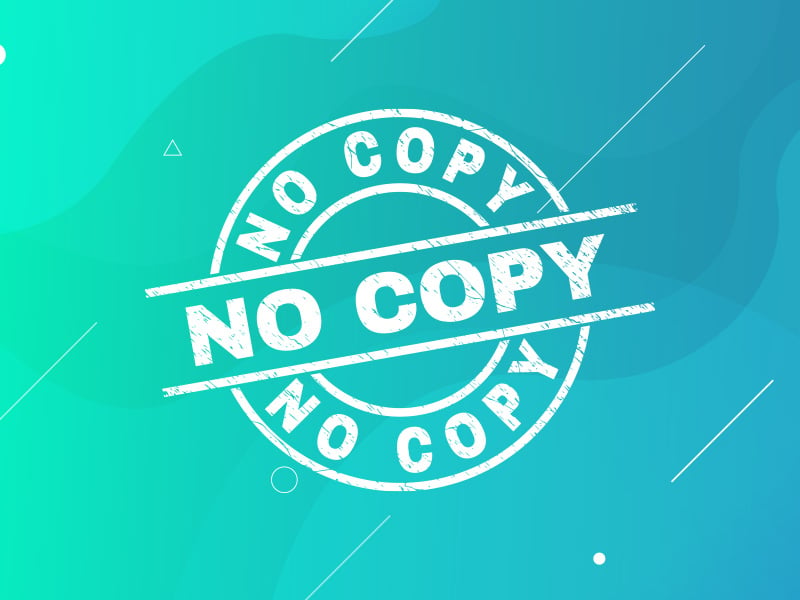As far as we know, we’ve had it happen once where someone copied our website. It was with the last version of our website that we had from 2015 to 2018 and they copied everything about the website but put in their own name and changed out a few pieces of content. They did a nice job with it too! It was different enough that the content could separate it but it was clearly our website with a few things swapped out.
While nothing online is truly unique, the website they copied from us was clearly a copy and not a coincidence. Too many things around their website were clearly copied from ours. We didn’t do much about it because it was clear it was just 2 kids trying to start a web design company and they needed something to start with. We felt no pressure from that website existing and instead decided to call them out on social media and congratulate them on having a nice website.
Their company has since ceased operating and the website is no longer online.
We get some clients who bring this up to us and even say that in the past someone copied my website so I want to make sure no one does that in the future. Or, they want to stop people from copying their website. Unfortunately, there isn’t a way to stop people from copying anything you put online. Literally nothing can be done to stop someone from copying your website.
However, in the US at least, anything you put online automatically becomes copyrighted and you can follow up on your rights there if you have to. The threat of that is enough to prevent people from flat-out copying your work but it can be costly for you to engage a lawyer so let’s chat about some options and keep that in mind as a last resort.
Understanding copyright law in regard to websites
That doesn’t prevent people from referencing it or using parts of your work on their website, like I just did with the above line, but it will protect you from blatant plagiarism. That article also goes on to say that it’s easier to win a legal case if there is a registered copyright, which is something you’d have to file and pay for. And again, this is only the case for the United States and anywhere else where these copyright laws are followed.
Why duplicate content is bad for SEO
Google likes to see original and unique websites and content. It’s always looking for new stuff to give better results on their search engine. They don’t want 2 of the same blog article showing up for a search - that would be bad for the user to get 2 nearly identical pieces of content or websites.
So, Google will choose one that it thinks is the original and only show that one. Hopefully, they pick the correct one - the one that came first, which Google has gotten really good at determining but they’re not perfect. So, if someone copies your website, you’re leaving it up to Google to decide which is the real one - there’s no reason to do that and you should fight for your rights in this situation.
And, kind of a side note, this also goes for content within your own website. Try not to use the same content (especially text) over and over on your website. Google doesn’t like that and it’s bad for SEO. You’re making Google pick the most relevant page and that might mean completely ignoring other pages. So, the best SEO option is to make everything as unique as possible.
How to find duplicate content
Yeah, but how do I know if someone copied my website? Well, you might not always know and sometimes it can be difficult to find them. After all, this whole thing about knowing that someone copied your website, but if you don’t know...well then there’s nothing to do here.
We sometimes use Copyscape to help us identify plagiarised content. It doesn’t help with images so we use Google’s reverse image search for that.
Copyscape isn’t free but their regular product is cheap enough that we can just check manually every once in a while. They also offer a sentry service that will automatically check certain pages and alert you if it finds a duplicate. Definitely worth it if this is something you’re worried about.
PS. Document Everything
If you need to and it comes to that, you may need to provide proof that someone copied your website. Hopefully, it doesn’t come to that but it might!
Start by taking screenshots, video recordings, and check the Wayback Machine. You’ll also want to gather information on when your website went live with dates, times, and where on the website it can be found.
Ask the website owner to remove what’s copied
This should be your first step. It’s free and not too hard to do. We’ve had instances where the owner of the website didn’t know something was copied - it was just some employee or freelancer who provided it and they didn’t check for plagiarism.
There’s a good chance that the website in question has a contact form or a contact email listed on the website. Use them! As always, it’s best to be polite if there’s something you want. But don’t be too polite.
If the website doesn’t list contact info or there’s no form, you may have to dig a little bit. We check the domain’s WHOIS information if we need to find a contact. In there, you may find actually info or you may find privacy contact info, in which case it will probably go nowhere. It’s actually highly likely that any info you find here will get you nothing, but it’s worth a try.
Contact their hosting to take the website down
Still have that WHOIS search up? In there, you’ll find out who is hosting the website.

You can contact their hosting service to place a complaint to have the website removed. If the company is in the US or recognizes copyright law, you should hear something back and have action taken.
Many hosting companies have dedicated contacts for DMCA violations. Just look for that contact information and submit your complaint. Use the documentation you gathered to give a full picture of what was copied and that you are the original and that they have violated your copyright.
If they don’t help you, then it’s probably a spammy website that doesn’t matter and Google won’t prioritize it in search results.
If all else fails, engage a lawyer
This option should be avoided if you can - lawyers are expensive and lawsuits are stressful. No one likes it but sometimes they are warranted.
A lawyer can help you exhaust all legal options, which we are not experts in so I would lean on their expertise here. Hopefully, they will explain that the cost and the damages need to be worth it in order to file a lawsuit.
You can also go after the hosting company for allowing copyright infringing material to remain on their servers. Companies tend to respond pretty quickly and take it more seriously when something comes from a legit lawyer.

